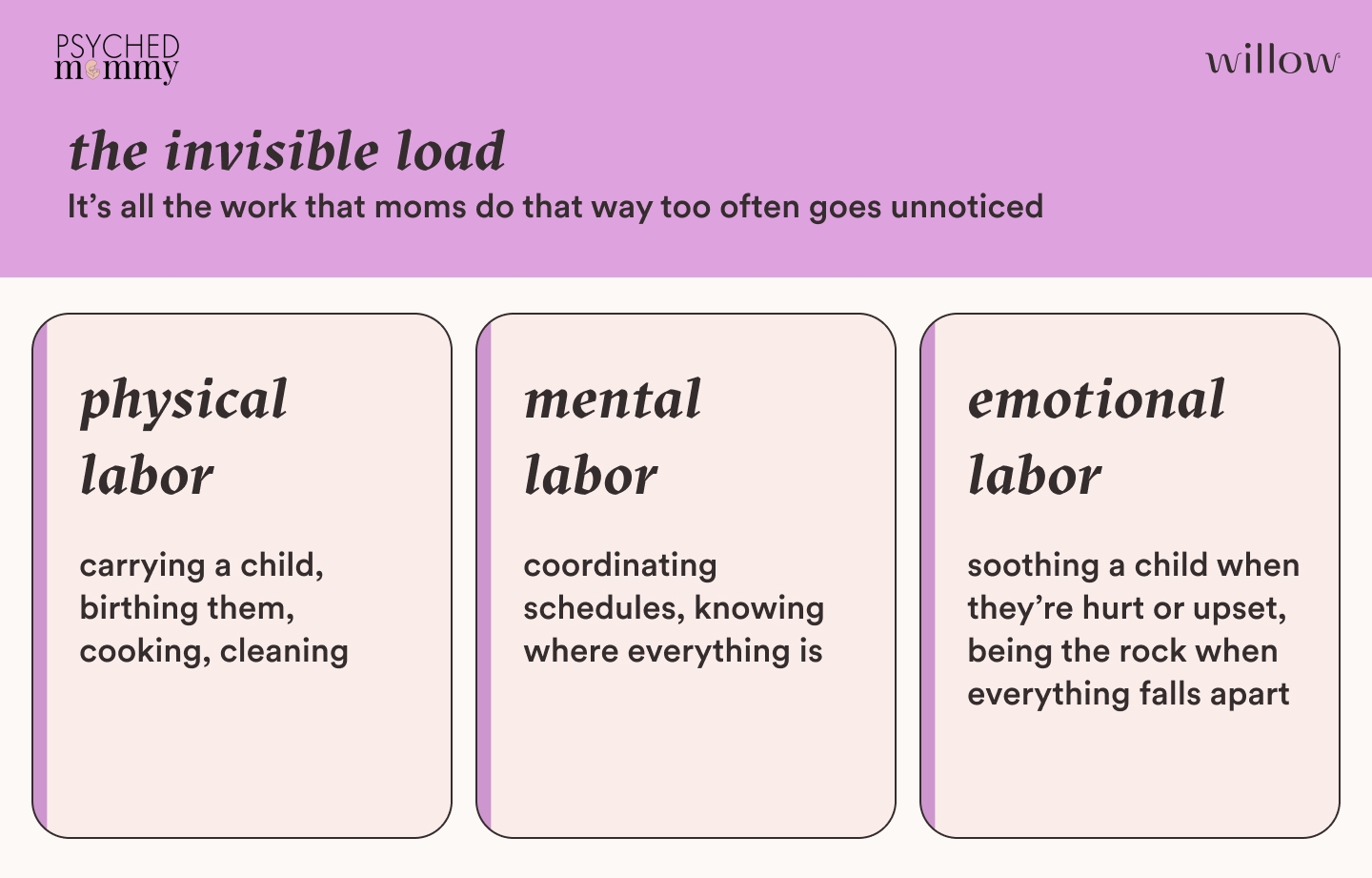If you entered parenthood in a committed relationship and thought to yourself “we’re a team…we’ve got this!” and found yourself disappointed by the reality of the unequal divide that is parenthood, you’re not alone.
Although it may not be displayed on social media, or shared in mom groups, mothers are drowning. They’re depleted. They have nothing left to give. They’re finding themselves unraveling in the offices of their providers wondering ‘what’s wrong with me?’ or ‘why am I so tired?’
Rather than calling out the unequal divide in parenthood, mothers have blamed themselves for falling short of the impossible demands placed on them.

Why is it that mothers feel so worn down? Let’s talk about the invisible load of motherhood.
The invisible load of motherhood is all the work mother’s do that often goes unnoticed. It’s the physical labor of
- Carrying a child
- Birthing them
- Nourishing the child
- Caring for the child’s needs
- Cooking meals
- Cleaning
The invisible load also includes the mental load, which can be overwhelming. The mental load includes:
- Coordinating schedules
- Being the replenisher of household items (knowing when something is going to run out)
- Keeping track of requirements for the child’s school (permission slips, homework, etc)
- Knowing where everything is
- Being the keeper of family traditions
- Being in charge of learning when there’s a gap in knowledge (i.e., learning about car seat safety, choking hazards, etc)
And then there’s the emotional load. Moms are nurturers by nature, and this often defaults them into the role of caring for all of the emotional demands of the family such as:
- Supporting a child through a tantrum
- Soothing them when they’re hurt or crying
- Being the steady leader when everything and everyone falls apart
This is just a short list of all the ways mothers do the invisible work. And the reality is, this work is unsustainable, especially since so many mothers are juggling household management as well as gainful employment. It’s resulting in burnout. It’s leading to bitterness and resentment in relationships because quite frankly it’s unfair.
A recent study from Arizona State University found that women who feel responsible for a majority of the household tasks as well as parenting duties experience life and relationship dissatisfaction.
In their study of 393 American women, who were in a committed relationship, and shared children, they found 90% of women felt solely responsible for putting together and managing their family’s schedule. It’s important to note that 65% of these women were employed. In addition, nearly 80% of the women in this study said they were responsible for their child’s well being and emotional state.
These markers were associated with distress, feelings of loneliness, overwhelm, and overall dissatisfaction. Carrying the invisible load doesn’t just impact a woman’s well-being. It often results in women leaving the workplace, remaining in unsatisfying relationships, as well perpetuates identity confusion mothers experience.
How can we stop mothers from being defaulted into roles they never signed up for and never hoped to have?
1. Make It Visible.
Much of what mothers do goes unnoticed and quite frankly breeds resentment due to the lack of appreciation. When mothers make their invisible work visible, they take up more space. They’re also able to create more realistic expectations of themselves knowing all that’s on their plate.
Tip: Write this down!
2. Give Yourself Credit
A couple of questions I often ask mothers: “Do you feel invisible to yourself?” “Do you notice the work you do?”
Mothers are notorious for self-deprecating, and minimizing the work they do. This can exacerbate the feelings of burnout and stress. When a mother is able to acknowledge the work she does and give herself credit, she changes the way she experiences just about everything.
3. Communication is Key
Communicating your feelings can be helpful if you have a partner that’s receptive to this feedback. Since women are often defaulted into this invisible work, it’s important to communicate how you feel and share your positive needs. This sounds like “I’ve really been feeling overwhelmed by juggling dinner and bathtime alone, I’d like it if you could bathe the kids while I get dinner ready” and see how that goes. This may take some work, but it will be worth it.
4. Sharing is Caring
Share the load. After you’ve written that list of all of the invisible work you manage, sit down with your partner and see which tasks they can take off your plate. You can start by telling them what would be most helpful or allow them to offer first. When you agree to sharing the workload, rather than being defaulted, it creates feelings of fairness.
5. Find Support
Sometimes you’ve gone so far off track that it’s hard to find your way back. A good therapist can really help. Sharing your feelings with an unbiased professional can provide clarity, and a cathartic release. Ask a provider familiar with your care if they have referrals for therapists in your area.
If you’d like more support navigating the unequal divide in your partnership, check out this workshop to gain practical tools for dividing the load in a way that feels fair.
Dr. Ashurina Ream of Psyched Mommy is a PMH-C licensed clinical psychologist with advanced training in perinatal mental health. Follow her on Instagram for more where this came from!













